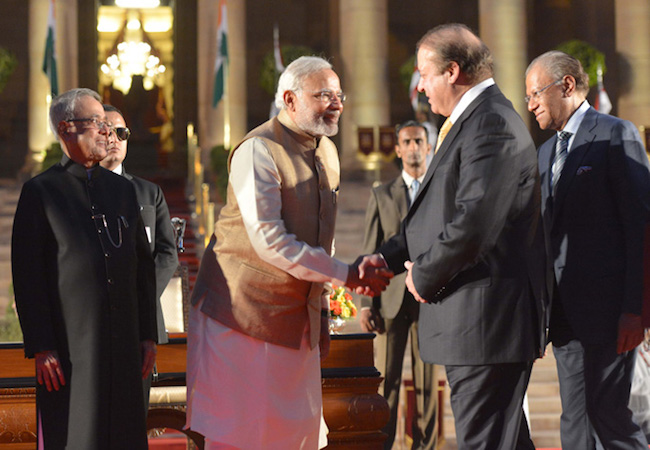
By Shahzadi Tooba Hussain Syed
The Paris conference on climate change may not significantly resolve the issue of global warming, but it has greatly helped Pakistan and India to once again initiate the course of amicable bilateral ties. The ice-breaking meeting between Prime Minister Sharif and his counterpart Narendra Modi in Paris on the sideline of the climate change summit was facilitated by the UK. The national security advisers of Pakistan and India later met in Bangkok to follow up on the discussions between the two prime ministers and to convey to each other their concerns.
The advantage of the neutral venue (Bangkok) helped end the deadlock in ties to some extent. The inclusion of references to terrorism as well as Jammu and Kashmir presumably satisfied both sides. In real terms, however, the reference to “tranquillity along the LoC” was of perhaps more immediate relevance. Pakistani negotiators did not insist on meeting leaders of Hurriyat Conference from Kashmir before or after the talks but the issue of Kashmir has been made a part of the comprehensive dialogue between India and Pakistan. The two sides quietly discussed terrorism and other security related issues.
The largest contribution from the Bangkok meet is that it has helped India and Pakistan avoid media spotlight. It is no gainsaying that with its constant coverage of Indo-Pak meetings, the media not only increases pressure on the interlocutors but also puts unnecessarily focus on tangible gains from such meetings. Furthermore, prior secrecy and the post-meeting public statement helped achieve several things: they prevented hawks on either side from scuttling the meeting; presumably allowed both sides to talk about substantive issues instead of indulging in rhetoric for domestic political consumption; and established a precedent for further meetings.
Several other factors had also contributed to India’s softened stance towards Pakistan. These included international pressure mainly, exerted by the US and UK to establish peace amongst the hostile neighbors. Both India and Pakistan were under tremendous pressure from United States of America and other world powers to resume talks because they favored dialogue. Discussions in Bangkok helped bring down political temperatures especially after Prime Minister Nawaz Sharif’s UN speech, and the handing of terrorism-related dossiers to UN representatives. International media had increasingly begun to highlight incidences of violence based on political and social disharmony within India. The fact is that Indian aspirations for global status could not be realised if its relations with its neighbors were strained.
Where Pakistan faced criticism for not acting against terrorist groups operating out of its soil, India also failed to bring about a significant improvement in the situation in Indian Occupied Kashmir. Bangkok, in a way, provided them a way out of a pressure-cooker situation.
Notwithstanding all its public posturing, even China would not want India to oppose its 2000-mile-long China-Pakistan Economic Corridor (CPEC) which aims at connecting China and Pakistan through railways, roads, pipelines and other development projects. The corridor will pass through Gilgit-Baltistan, Azad Jammu Kashmir (AJK) , Baluchistan in Pakistan and Xinjiang in China, three extremely volatile regions where the potential for fomenting unrest is tremendous.
On the domestic front, Prime Minister Narendra Modi’s image was being tarnished by right-wing intolerance. The lack of an economic turnaround in India, together with a defeat in Bihar, had likely compelled a rethink on the limits of extremist posturing. It was also clear that regional energy and economic cooperation on mega-projects will not mature without improving relations with Pakistan.
There was now a realisation in both countries that the advantages of economic and political cooperation far outweighed those of continued confrontation and hostility. Peaceful coexistence would open up expanded avenues for trade and commerce, and bring about increased connectivity within South Asia and beyond to Central Asia. For instance, New Delhi wishes to move forward on bilateral trade which has remained much below its potential.
The two countries, according to Indian High Commission in Islamabad, did business worth $ 2.35 billion in the financial year ended on March 31. The World Bank hopes that easing travel restrictions and reduction in tariffs could increase the bilateral trade between New Delhi and Islamabad to $ 12 billion (over five times more than the current). The obvious immediate winners are the cement and sugar industries, both of which Pakistan has a surplus of and India a shortage of, and which can be transported at low-cost across the border. India has a growing agriculture and automobile industry, which Pakistan needs. Pakistan wants to learn India’s ICT skills, and India can leverage Pakistan’s textile manufacturing expertise and global market reach. India also seeks transit arrangements with Pakistan for on-road trade with Afghanistan via Wagah border near Amritsar. Each nation is losing 30% to 35% in revenue by routing trade through third countries.
Another keenness for comprehensive dialogue is the fact that Indian Vice President Hamid Ansari will soon be travelling to Turkmenistan for the launch of construction of TAPI (Turkmenistan-Afghanistan-Pakistan-India) pipeline for natural gas. The 1800 km-long pipeline, which is expected to be completed by 2018 end, has been hanging fire for 25 years.
For India and the Western powers, Pakistan’s handling of the Mumbai trail would be crucial. It is in Pakistan’s own national interest to bring the Mumbai trial to a close. India would similarly have to expedite the prosecution of those involved in the Samjohata Express bombing. Recent positive developments have contributed to reducing tensions and stablising the situation on the LoC.
An old truth stands validated: without a strong and bold leadership, the India-Pakistan relationship will forever remain hostage to old suspicions and hostilities. The road to bilateral reconciliation will be a long and treacherous one. But perhaps economic compulsions will overtake political ones.




